Far Away Eyes’ Deeper Look Supernatural 11.14 “The Vessel”
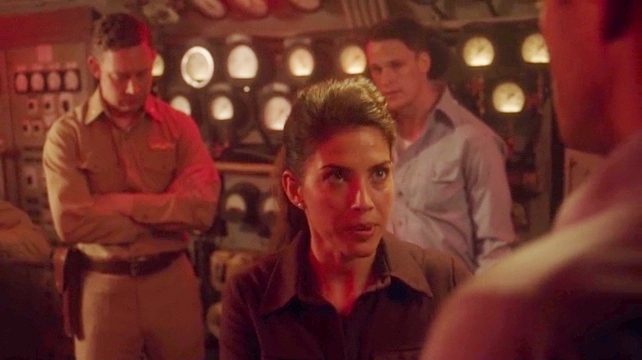
Let’s start with Crowley.
Crowley may not be seen extensively in the episode, but from the very start it is clear that he has sacrificed much. His dignity is his biggest loss. He’s being forced to wear an ugly Hawaiian shirt and chains. Crowley is treated like a pet dog by Lucifer, referred to even as “doggy.” His tumble from the throne has humiliated Crowley in ways he couldn’t have even imagined in his worst nightmares. Lucifer is fully in charge and can do whatever he wants with the operation Crowley built—meaning he’ll largely ignore it, dismantle it, or destroy it simply to punish Crowley in the process. Crowley’s sacrifice is one that’s largely forced upon him. He knows that he does not have the strength to stand up to Lucifer. He hasn’t the power or the might to win in a fight against the Devil. To fight is to die—and after seeing his mother’s reward for helping free Lucifer he knows that there’s little he can do that won’t lead to his demise.
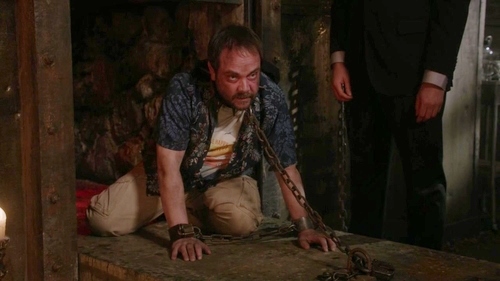
And so, Crowley sacrifices his very dignity by becoming extremely humble. When his former underlings get a bit testy, impatient, and a bit demanding with Lucifer, he calls them out on it. He keeps his head bowed, his eyes averted, and admonishes them for not speaking much more respectfully to their master. He accepts his place as “doggy.” Even so, that doesn’t mean he’s lost all his fight. Lucifer can tell there’s still a “whiff of defiance” in Crowley. The former King of Hell has sacrificed his dignity for a very good reason: survival. If he doesn’t capitulate to Lucifer and plot a way out of this, he’ll surely die here and now. If he doesn’t at least make the effort of being an obedient pet he’ll never be able to overthrow the Devil and possibly mount a new campaign to retake his throne.
In some ways, then, his sacrifice seems rather selfish. He has a goal of replacing the Devil as the King of Hell and wreaking havoc on Earth all over again. Crowley is most certainly no hero and his aim in ousting Lucifer isn’t rooted in some “greater good” or sacrificing himself for a cause larger than self. That being said, Crowley’s ability to survive and perhaps work against Lucifer in some capacity may lead to some good—especially if he can somehow find a way to reach out to the Winchesters. They’ve been enemies and on opposite sides many times in the last few years, but Crowley knows the hard and fast rule of “the enemy of my enemy is my friend,” and so his siding with them may lead to a victory as it did once before. In that way, his “sacrifice” now of his dignity can be seen as a seed for a sacrifice with a real purpose.
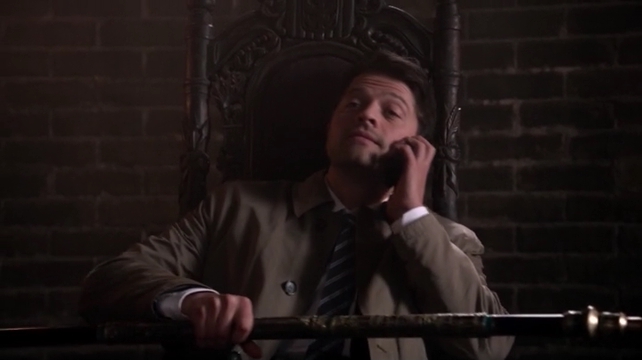
Lucifer, on the other hand, has no qualms that his sacrifice is selfish and self-serving. Since his reemergence from the Cage while possessing Castiel, he’s put on a facade with the Winchesters. He’s allowed them to think that Lucifer is still in the Cage and that their angel friend is as he’s always been. As Dean calls him about the time travel mission, Lucifer slips on his “Cas Mask” once more—all in an effort to fool them into telling him what they know about Amara. The moment he answers the phone, however, and says “Hello, Dean,” it’s apparent that this facade will not hold. The level of hatred, animosity, and loathing that enters into that simple phrase is so obvious.
That only becomes more apparent the longer he works with the Winchesters side by side. Lucifer is a good actor—and yet he lets cracks appear in his performance that gives him away hundreds of times. He’s eager and excited about the possibility of acquiring this weapon. After all, despite Crowley’s sacrifice in dignity, the former King of Hell is right. Lucifer isn’t strong enough to stand against Amara alone—and the weapons he had gathered are not potent enough to aid him in that conflict. This may be the very thing he needs and he’ll use the Winchesters to get it. As he watches Sam and Dean argue back and forth vehemently about time traveling back to the sub that contains this object, he lets the mask slip several times, his smile broadening as he realizes he may have the potential to travel with Dean back in time, kill Dean, and acquire the weapon all in one swoop.
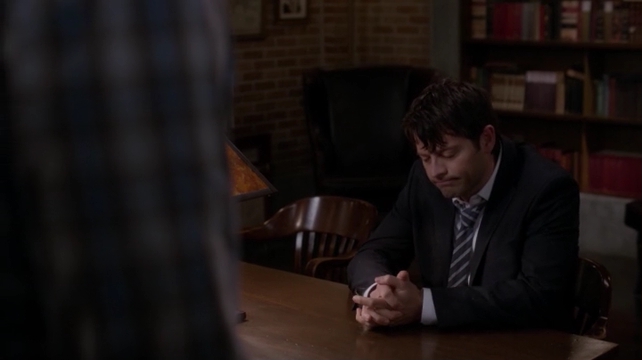
And yet, he manages to keep the act going long enough to get Dean back in time only to be thwarted by warding. His frustration at this development makes his Castiel mask slip even more—to the point where he even says, “I can’t believe I lost it. Him. I can’t believe I lost him.” While Dean’s life hangs in the balance, Sam is frantically throwing solutions at him, demanding that they must find a way to get Dean back safely. He’s frustrated and annoyed the longer this goes on—until Sam points out the spell that uses the power of an archangel. Since Sam thinks he’s Castiel, the argument shifts from Sam worrying about Dean only to telling Lucifer that he’s not strong enough. Pushed to the limit, Lucifer snaps.
He throws the facade away, sacrificing it. After all, he tells Sam, “Why have I been trying to spare you? It’s just, I don’t need you anymore. I mean, Dean’s the one with the link to Amara. Why have I been trying to spare you? Maybe it’s because you’re like the girl who kept turning me down at the prom. I will touch your soul, just because you asked so nicely. And I’ll use your spell to blast through the warding and retrieve Dean and the, um, Hand of God. And then when Dean comes back and he finds this place decorated with your guts, I will tell him the truth, Sam. I’ll just say, ‘Dean — Dean… he knew the risks, he wouldn’t take no for an answer.”
His sacrifice of his Castiel masquerade is purely selfish. He knows that he could have potentially toyed with the Winchesters longer. Lucifer knows that he may have made the reveal a bit more heartbreaking if he had waited a bit longer, but in reality wearing this Castiel mask just got in his way. His purpose is to take down Amara and playing mind games with the Winchesters only gets in the way. Besides, it lost all its luster when he knows he won’t get what he wants from Sam anyways.
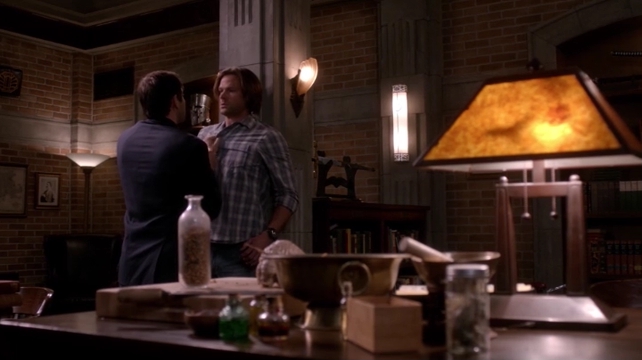
Instead, Lucifer will punish Sam here and now. In that way, Lucifer can also eliminate another threat in Sam. He knows that Amara is his number one goal right now—but if he doesn’t take into account the Winchesters he’ll be making the same exact mistake he did during the Apocalypse. They’ll unite against him, put him back in the Cage somehow, and destroy his plans. So, Lucifer makes his move. He plunges his hand into Sam’s gut and starts to crush his soul all in an effort to kill him. Then he can get the Hand of God and not have to look over his shoulder.
Castiel’s intervention is the only thing that stops him here.
Lucifer’s desire to beat Amara is not out of a greater good. He doesn’t care if the whole world or the Dante construct survives—evidenced by his statement of “Don’t care,” to the demon asking to share the soul collecting report. Instead, his sacrificing of his Castiel mask allows him to focus his attention on eliminating her so he can become the big bad on the map. He’ll subjugate the world as he had planned before being thrown back in the Cage and destroy God’s creations simply because he can. And now that he possesses Castiel, he also knows everything and then some about the Winchesters that he didn’t before. Why pretend to be their friend when he can extract the information he needs from his fellow angelic passenger?
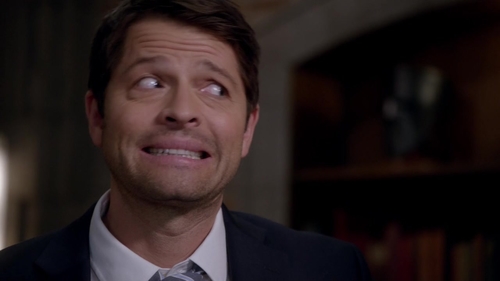
Now that he’s exposed, Lucifer sums up beautifully why he sacrificed his Castiel facade: “I feel a burden lifted. You know, this whole deep cover thing, it just wasn’t, it wasn’t terribly well thought-out. Donning this-this Cas mask, this grim face of angelic constipation. Just ugh. And then teaming up with you two. I mean, I thought you boys were insufferable as mortal enemies. But, working with you, that’s the soul crusher. Why the faces, boys? You should be cheering. We have a common enemy, and with this she should be no problem. I mean, I will have killed you both by then, but still, come on.”
And yet, Castiel is still inside the same vessel. He’s strong enough to take control briefly to stop Lucifer from killing Sam. He’s strong enough to surface if just for that very moment. And yet he’s also making a sacrifice: that of self.
On one hand, Castiel’s sacrifice seems to pass the test of the greater good. His goal is to stop Amara. He knows that the Darkness will destroy everything and that they must do whatever it takes to stop her. This is a battle bigger than him. It’s bigger than Sam or Dean. It’s bigger than everything. In Castiel’s view, they have no choice. Much as Sam remarks that the Men of Letters employing a woman during WWII is an “all hands on deck situation,” Castiel believes firmly that they must have all assets and power players on the board—including Lucifer. Lucifer may be strong enough given the right weaponry and strategy. As far as Castiel is concerned, his evil is outweighed by the fact that Lucifer’s defeated Amara once already. They need his help badly.
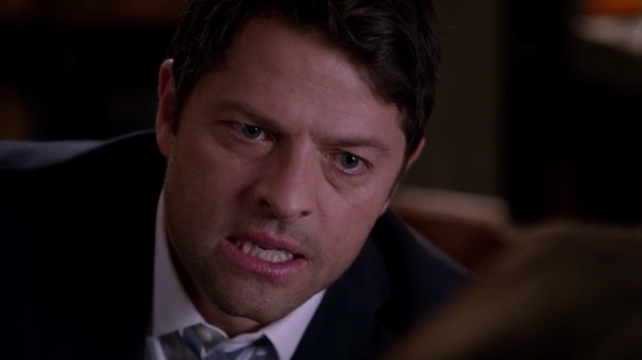
On the other, Castiel’s sacrifice of self here is also rather misguided. Sam said no because he realized that Lucifer was far too dangerous in the end. He knew that no matter what promises the Devil made it would end with the whole world burning. Either Amara would do it or Lucifer would, but the result would be the same: everyone would suffer. Sam understood that clearly in his refusal. Castiel, on the other hand, sees saying yes to Lucifer as their only option. After all, Amara is a far worse evil and he’d rather put his stock in Lucifer than the Darkness.
Castiel sacrificing himself here exposes a fundamental truth about the angel. He does not see himself as a person. He does not see himself as an individual. Designed by God to serve as an unquestioning and unflinching soldier, the concept of self has never been one strongly ingrained in his kind. Angels aren’t supposed to see beyond orders or God’s plan. Their prime directive is to follow the mission—one that has been warped and convoluted through the centuries and especially after the absence of God. Castiel’s seen himself as a member of a Garrison. He’s been part of the Host. His inclusion in those numbers has simply been that: a number.
With as many angels that have been sacrificed along the way through the Apocalypse and after its failure, it’s no wonder that he sees himself as expendable. It’s the very language he’s had used towards him by everyone from Metatron to the number cruncher, Ambriel, to Amara. So, Castiel feels that he’s able to sacrifice himself here and now to Lucifer in the effort to stop the Darkness. He tells Sam, his voice weary and broken, “I wanted to be of service to the fight. And only Lucifer can beat her.”
This belief is highly misguided and dangerous. Castiel has been human for a time. He’s witnessed and watched the Winchesters fight for their free will, their person-hood, and their individuality on multiple occasions. His expulsion from the ranks of the Heavenly Host have left him adrift, but he should see their rejection not as a failure but as a gain. He isn’t like them now—not really. His thinking shouldn’t be to sacrifice himself to a great evil like Lucifer in the hopes that it will stop the Darkness or perhaps eventually restore him to Heaven’s good graces. Instead, he should be looking to Sam and Dean’s example of championing the individual, of saving every person they can—sometimes on a case by case basis—and not seeing himself as expendable as the other angels do.
Castiel’s inability to see his own worth or to take on something like Lucifer as a form of atonement also shows just how messed up his thought process has become. By all rights, his witnessing of Sam’s refusal should have led him to do the same thing. He should have acknowledged that Sam made that conscious choice not to sacrifice himself because it would not serve the greater good. Sam, even with his own self-esteem issues, saw through Lucifer’s lies and realized just how dangerous it would be to give into this temptation. It would not be for the greater good—it would be for Lucifer’s selfish gain of freedom.
As the Winchesters discuss his choice in the end, Sam sees what Castiel has sacrificed and he recognizes it as folly. As someone who could have made the same error in judgment, he knew exactly what Castiel had agreed to. He knows that it will take a lot for them to convince Castiel to eject the Devil. Dean, on the other hand, isn’t ready to believe that mistake. Nevertheless, until Castiel is ready to recognize it as a mistake, Sam’s right. He might not come back willingly.
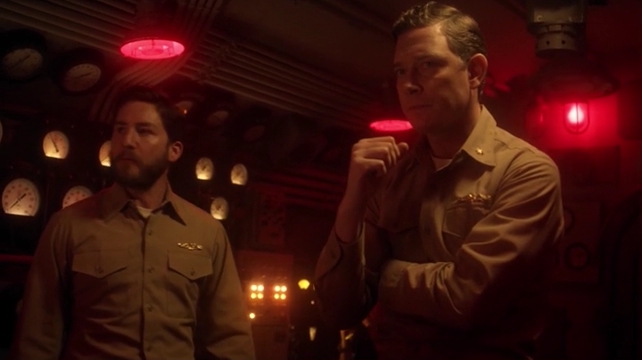
The supernatural beings weren’t the only characters to wrestle with the question of sacrificing with a purpose. The Bluefin submarine crew also had to grapple with it. Told bald-faced by Dean Winchester that they are doomed to be sunk by a Nazi destroyer, the crew at first scoffs. They accuse Dean of going AWOL, of slinking away on their ship to go home, and to be a spy. As it becomes apparent that he’s telling the truth, however, they start to accept their fate little by little. The crew member, Giraldi, that guards Dean goes as far as to ask, “When do we win? Months, years, decades? I’ve got a lot of friends, family on other ships, in other branches. I want to know what their chances are.”
The crew is scared as they try to evade and limit the damage they’ll take. They’re fighting the Nazis. They want nothing to do with any terms of surrender—and yet survival is still a human instinct they must grapple with. It’s a tragedy they know is coming and yet cannot prevent. The Nazis reach out to communicate with the ship—and in particular Delphine. After all, she’s the one that has the cargo they seek. They give the Bluefin three minutes to decide. Do they hand over Delphine and her cargo and become POWs or do they die right with her?
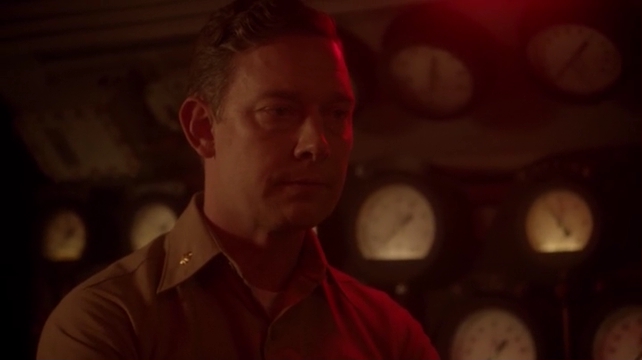
The captain is steadfast in his choice. They will fight back. There will be no surrender. Instead, they will sacrifice themselves to save the cargo they were sworn to protect. He tells Delphine, “Our orders were to protect you and your cargo. We wouldn’t even consider a surrender.” To sacrifice their principles, to sacrifice the weapon in question, and to capitulate for even one moment to the Nazis is not in their make up. They will sacrifice their lives for the greater good of defeating the Nazis and thus saving the world from their tyranny first. It’s an honorable sacrifice. They see the war effort as bigger than themselves—far more worthy than the cowardice of surrender. This isn’t about their views on their self-worth. This crew knows that their mission is to fight this war and to contribute to its effort in any capacity they must. If, in the process of dying, they can take out one Nazi sub, they’ll take it.
Alongside them, Delphine leads this sacrifice. A member of the Men of Letters, she is a French woman who had gone undercover. She had entrenched herself with a Nazi leader, stolen the Hand of God from him, and promptly killed him. Her mission, then, was to get the object across the ocean and to the Bunker. She had been in contact with Clifford Henshaw. It was a dangerous venture. As a Woman of Letters, she knew how high the stakes were and just how dangerous the weapon was. When she shows Dean, who gains her trust by revealing that he is a Men of Letters, he’s unimpressed with the object. It looks like a hunk of wood, nothing more. She tells him, “It must have been more impressive in its complete form: the Ark of the Covenant.”
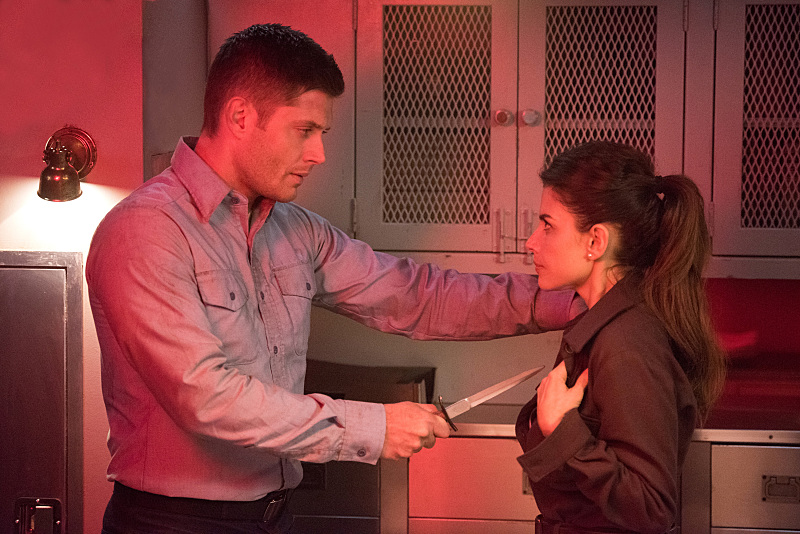
Delphine’s also the one that has warded the submarine against everything—including angels despite not knowing of their existence. Her warding is blocking Dean’s way out. He can’t rescue this Hand of God and bring it back to fight Amara if he can’t get off of the sub in time. She’s placed the warding on the walls in various places in the sub, but that leaves one special warding. It’s etched into her very skin and she tells Dean, “It’s power lives and dies with me. Kill me.”
On the surface, this seems a hasty decision. Digging deeper, and it’s apparent that Delphine is doing this with only her mission and the greater good in mind. She needs this weapon to be out of the reach of the Nazis. If Dean is truly from the future as he claims, then what better way to protect the weapon than to send it with him? So, Delphine will sacrifice her own life to give Dean the weapon. It’ll help them keep the Nazis from acquiring it and it’ll help Dean in the war he claims to be fighting.
As time runs out and they are faced with the Nazis order to surrender, however, Delphine knows they can’t wait much longer. She knows they’re already doomed. With the demand to surrender coming from the Thule member, Delphine knows they have little time. If she doesn’t act now, it’s possible she will fail at her mission. If she doesn’t act now they may end up handing over the Hand of God regardless. That can’t happen.
She takes out the Hand of God, and she tells Dean, “You save this ship, get us to the surface, and then what? The power of God will consume you, and you’ll have merely brought the weapon closer to the Nazi’s grasp. We’re supposed to die, let us do it with purpose.”
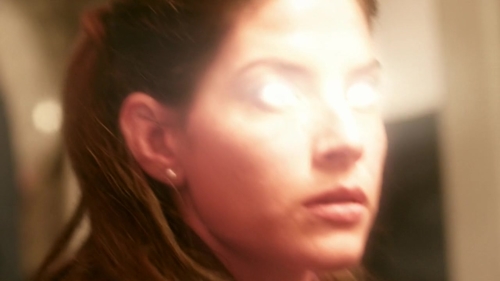
As the power starts to flow and it’s obvious it will destroy both the Bluefin and the Nazi sub, Dean is yanked back just in time with the object in hand. Delphine sacrificed herself to buy him enough time. Delphine truly understood that this mission was far larger than herself and that she had take all steps to protect the cargo entrusted to her. It was too dangerous to let it fall into enemy hands. The world itself hung in the balance, and faced with her imminent death, Delphine chose the courageous path and sacrificing with a purpose—thus giving this episode its ultimate theme in a concise and powerful moment.
The Winchesters have been floundering in their search for Amara, how to handle what they’ll do about her, and what their next move will be for awhile now. Any lead will be followed to the furthest extent—including dangerous ones. When the Hand of God is revealed to have been lost on a WWII submarine, it is Dean that is willing to sacrifice himself from the very jump. He talks fast to sell his concept of time travel. If they weren’t going to risk messing up any timeline, if they were going to get the weapon they needed, it would all be worth the possible risk. And yet, he can’t hide the true reasoning for his willingness. He states, “Just in case things go sideways, somebody needs to be left standing to take care of the Darkness. We can’t risk us both! And at the moment, I’m the least valuable player, you both know that I can’t kill Amara! So the least I can do is get the thing that we need so you can! ”
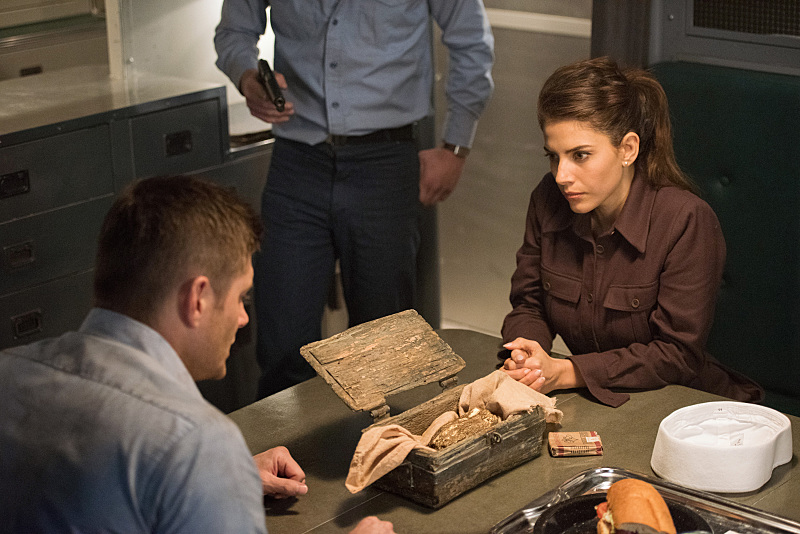
In many ways, Dean’s drive to sacrifice himself is misguided. To sacrifice himself for this reason does no real good. It clouds his judgments, too. If he sees himself in such a poor light, it can expose him to great risk. To do this because he sees himself as expendable also masks the real reason to do this. They may need this weapon absolutely, but he has to shift his viewpoint on sacrifice so he knows the right way to do it, the right reason to do it, and the right time to do it. Sacrificing simply to sacrifice doesn’t help matters in the long run. It simply makes Dean all the more vulnerable.
His witnessing of Delphine and the Bluefin’s crew’s willingness to sacrifice themselves for a greater purpose allows him to have clarity on their current situation. None of these people saw themselves as bigger than the mission—or lesser than the mission. They simply saw themselves as part of the mission. Even so, they were also human and scared. It was clear in the way Giraldi talks to Dean. He’s terrified about dying. He tells the elder Winchester, “But we all die? Me? The girl? The rest of the crew? I’m just trying to get your story clear.”
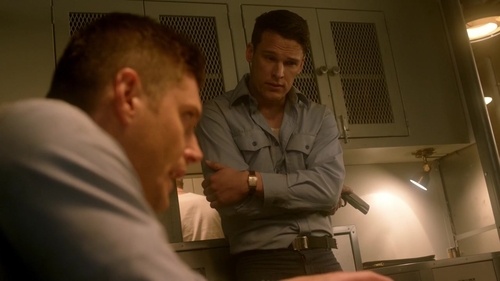
In many ways, Dean can recognize this fear. He’s had it himself in the past. And yet, he’s allowed that very human emotion to become seen as a weakness. It’s not. This crew had all the same flaws and fears that humans have. They all had the same difficulties with what they were doing or what might happen to them. And yet, that very human nature didn’t hold them back. Their fears didn’t drive them nor did it make them sacrifice for the wrong reasons. Instead, they harnessed that humanity and turned it into courage. Dean needed to see this very courage so he could combat the fears he carries himself. By seeing their struggle and their ultimate triumph, Dean can take his own feelings of insecurity, grief, anger, and fear and turn them to his own advantage.
Along the way, Dean also builds a very human relationship between himself and this crew. He connects with Delphine, “Men of Letters to Men of Letters.” Their fight, by virtue of his presence, has become somewhat his fight. Dean knows that everyone he’s meeting here is doomed and has been dead for over seventy years already. But seeing them? Talking to them? Watching their bravery as they face certain death reminds him in many ways why he himself fights the fights he does. It reminds him of the strength people have under the most extreme pressures. Dean is a witness to the very best humanity has to offer here. None of these individuals are perfect. They have their own flaws, their own prejudices, their own metaphorical demons to fight. Death frightens them just as much as it does anyone.
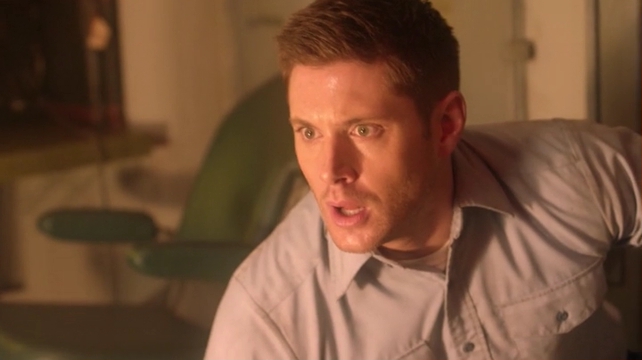
But seeing their story up close and personal during the height of such a terrible and brutal war, Dean can apply those same lessons to the war he’s preparing to wage at home. They may be facing mostly human monsters in the Nazis and Hitler—but being chased down by a member of the Thule reminds Dean that supernatural wars can be fought in many ways and on many fronts. This is no different than his fight against Amara. Certainly, the Darkness is a much bigger foe than this Thule member, but the danger and the certain death these people face in their battle makes it a level playing field in Dean’s mind. He knows that he could be on the same precipice as they are right now—or were seventy years ago. He knows that he’ll have to come to that exact same crossroads: to surrender or fight back with everything he’s got even if he knows he’ll possibly die.
It may take time for him to come to this conclusion. It may take time for Dean to truly see this truth. But his time on this submarine reminded him that fear is not necessarily bad. Insecurity and doubt aren’t always foes. His drive to sacrifice himself simply to sacrifice himself isn’t necessarily the answer. Instead, he can build courage from these feelings seen as weaknesses. He can learn to sacrifice with a purpose. He can work towards a greater good with the right mindset. Over time, Dean may come to those conclusions. As the dust settles from what he experienced here, he can draw from their example. He can learn how to fight back against the Darkness—and now Lucifer—in the only way he knows how: through his humanity.
And that is something he knows he must never sacrifice.
While Dean endured the lessons learned on the Bluefin, Sam, too, had to face the question of when to sacrifice with a purpose. Worried about Dean and his reckless idea of time travel, he makes “Castiel” promise to stay with Dean. He is terrified that his brother might not come back from this. This is reckless Dean at his worst, and Sam knows all the warning signs. What can go wrong often does. His fear and weariness is written all over his face. Sam’s fears do come to fruition—just not in the way he thinks.
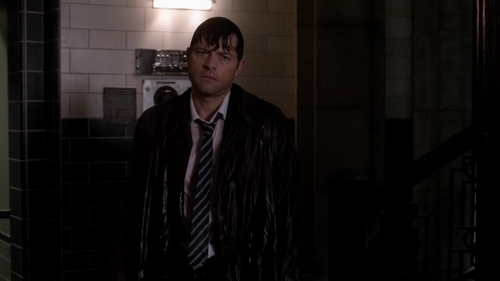
Working on the case while he waits for Dean and “Castiel” to return, he’s stunned to see the angel traipse back into the Bunker soaking wet and aggravated. He starts to panic when he doesn’t see Dean following behind and is told that Dean is stuck in 1943. Instantly, Sam starts digging into lore, looking into spells, and trying to find ways that will extract Dean from the submarine before it’s too late. He even tells “Castiel,” “Don’t worry, we’ll bring him back.” His working alongside “Castiel” seems comfortable and purposeful. There’s a unity as they work side by side—and while the viewer knows that it’s really Lucifer, they almost seem to be on that same side for the briefest of moments.
It won’t last. As Sam hits a dead-end with the spell he found, he’s stunned that “Castiel” is willing to try it. It occurs to him, however, that the angel won’t need it. Bobby had once let Castiel touch his soul to bring them back form the wild west. Why not use him to do the same thing for Dean? If it’ll retrieve his brother and the Hand of God, it’s worth the risk. After all, why not take on some risk in their mission to acquire this weapon—do his part in the cause?
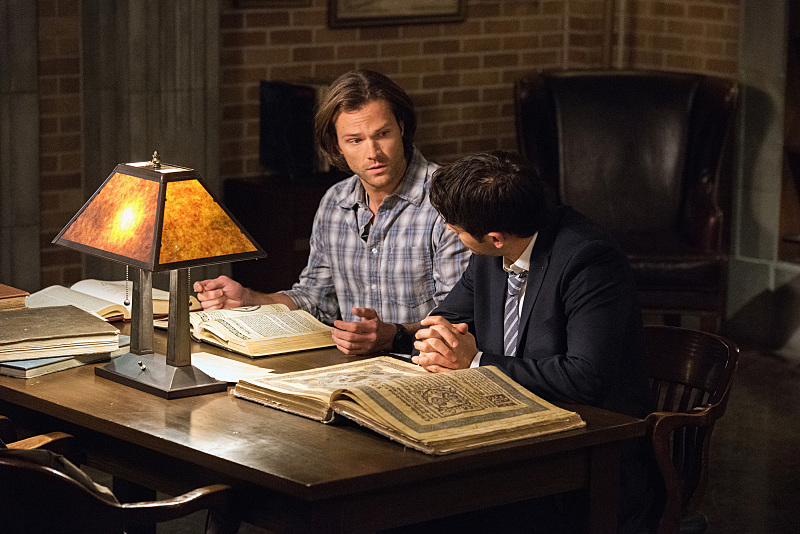
Sam is willing to sacrifice himself here for his brother’s welfare, certainly. He states, “Dean needs our help.” And yet, it’s clear in his arguments with “Castiel” that he realizes this is bigger than saving his brother. Sam is also thinking of the greater good. They sent Dean back on this mission in an effort to stop the Darkness. Sam will not let that sacrifice be in vain. He tells “Castiel,” “I trust you.” He knows that this risk could be fatal, but he knows that they must at least try and then Dean can use the weapon and stop the Darkness anyways. Sam will play his part—this mission is bigger than him.
After the truth is revealed, however, Sam is severely injured by Lucifer’s painful intrusions on his soul. He’s battered and broken on the floor—and yet not defeated. Lucifer was right in declaring that Sam would refuse him as if he were a “prom date.” It’s become quite clear that Sam Winchester will always say no to the Devil. It is that strength and that courage that will allow Sam to beat back the Devil when the time come once more.
Resigned to trusting a Castiel willingly trapped with Lucifer, to bring back Dean, he outs the angel upon their return. He shouts, “Dean, that’s not Cas!”
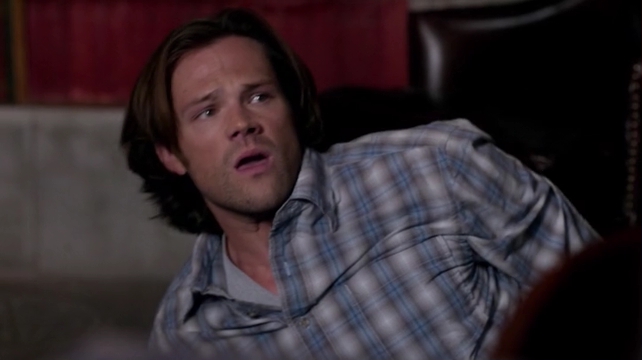
Lucifer doesn’t seem perturbed by this development. He’d already sacrificed his mask. And yet, his own hubris as he taunts the Winchesters will come back to haunt him once more. Sam will use it as a weapon against the Devil. As he’s still in a heap and in pain on the floor, Sam takes the time to draw a symbol in his own blood. Lucifer, certain he’s going to triumph over the Winchesters once and for all, tries to use the Hand of God only to discover that Delphine’s use of it on the sub has used all its power. He can’t obliterate them and he’s been denied his chance to kill Amara.
Incensed, Lucifer charges Dean with the intent of killing him by other means. Distracted by this rage, Sam makes his final move. He slaps his hand on the banishing symbol and Lucifer is forced out of the Bunker in a blinding flash. It was another sacrifice that Sam had to make. He was in severe pain from Lucifer’s assault. He could have allowed himself to pass out or to writhe in it and let Lucifer do as he pleases. Instead, he stopped the Devil once more.
Afterwards, despite the mental and physical anguish Sam must be feeling, he sets that aside to talk to Dean about what his brother went through. He’s patient and understanding in the exchange. He knows that Dean is shaken by what has happened—first on that submarine and now with Castiel. Sam doesn’t push too hard. He doesn’t demand anything. He sacrifices his own need to talk about what happened between him and Lucifer in order to give Dean an opportunity to share. When Dean chooses to hold back, Sam chooses to accept that and sacrifice his need to know. He’ll let Dean come to him when he’s ready—just as he did when he admitted the truth about Amara’s hold.
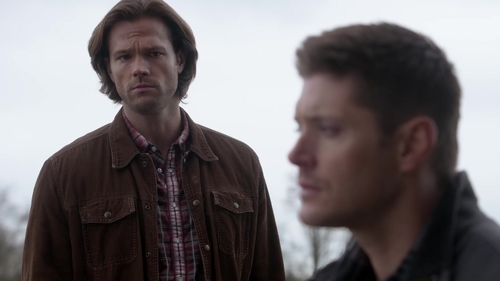
Sam, by example, is showing that he already knows the truth of sacrificing with a purpose. He knows that the greater good is everything—and that they cannot give in on principles any longer. He knows that they must keep their eye on defeating Amara—but not lose their humanity in the process. It’s one reason why he’s been so adamant this season about sticking to the “saving people” portion of their mission this year. Saving as many people as they can will allow them to triumph in the long run. He also knows that they have a long fight ahead of them and that those sacrifices may just continue to grow. Sam, having endured his test with Lucifer in the Cage, is fully prepared to continue that fight for as long as it takes.
In the end, it is the sacrifices they’ll make for the right reasons that will defeat both Amara and Lucifer. In the end, it is not sacrificing their humanity that will allow Sam and Dean to win for the greater good—and for each other.
For to sacrifice with a purpose, to practice the family business of “saving people, hunting things,” is rooted in these principles seen here.



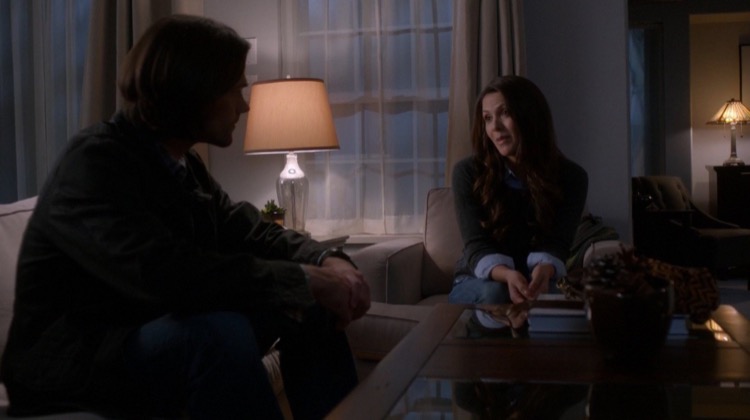
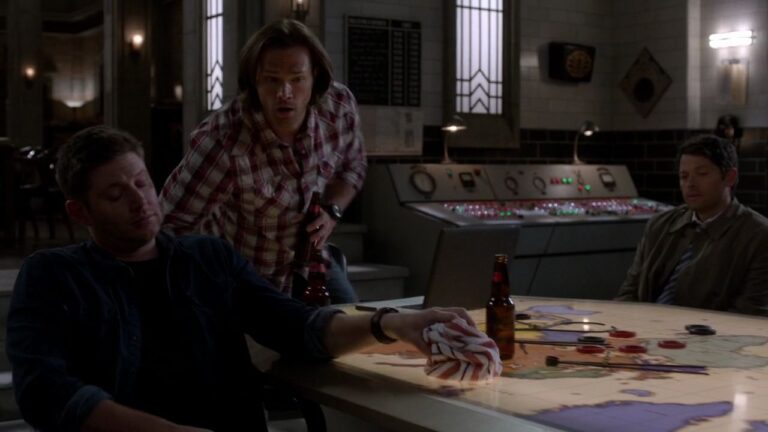
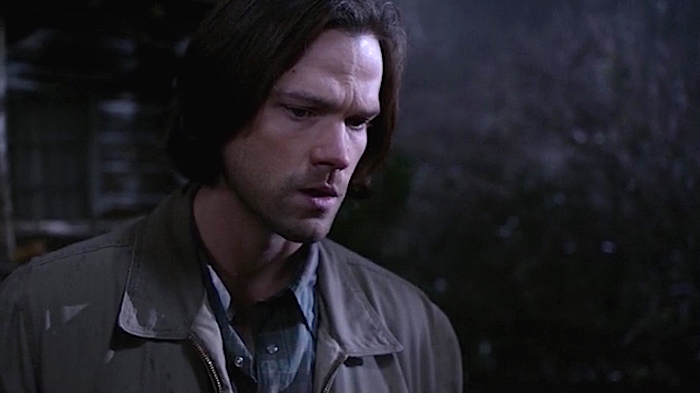
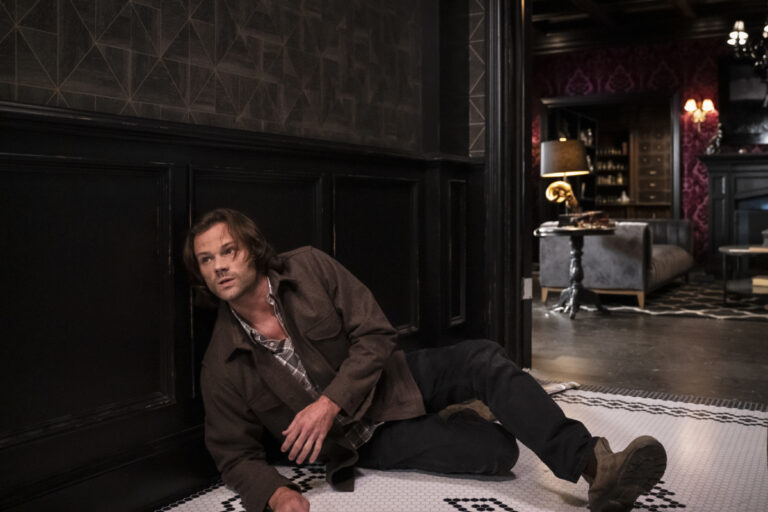
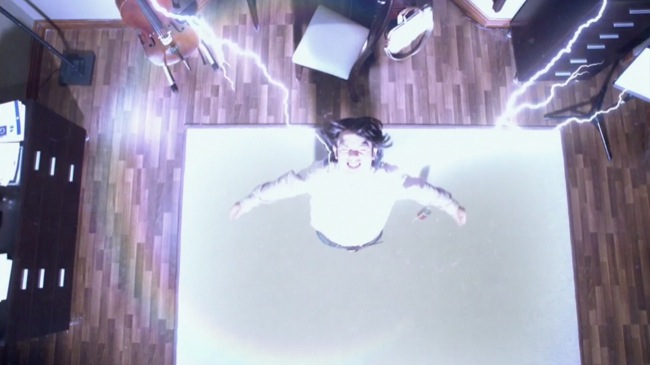
ITA on the “theme” this week was sacrifice. One sacrifice that NO ONE has mentioned (thus far in my reading), is Delphine’s sacrifice to play consort to the Nazi Thule. She clearly was sleeping with her hated enemy. Sure, it’s a Hollywood trope but I think it was more than that. I’m not implying Dean has to sleep with Amara, but he may have to “play along” with this bond that Amara has in order to get an opportunity to defeat her (or put her back in her prison). That is just NOT Dean. He wouldn’t want to deceive Amara. She’s not actually, IMO, as heinous as the Nazi’s. Her nature is incompatible with humanity. But there’s none of the “I am superior” crap. She just doesn’t GET the value of humans. Hopefully Dean will teach her that. So, if he HAS to play along and eventually trick her — that’s going to hurt. And seeing what others (like Delphine and the crew of the Bluefin) did for the greater good is going to make this easier.
Thanks for the comment. I”m glad you enjoyed this look at this episode.
I think it was absolutely a sacrfice on Delphine’s part and in many ways an homage to the film noir (also French!) of the period. I don’t know if Dean will have to go that far or will go that route with her. I agree that Amara simply doesn’t understand humanity. She’s been so outside the construct and would like to reformat the world to her version. How humans or what humans would become in that is left to be discoverd. I also wonder if Dean would be able to deceive her that way. I get the impression that she can tell what he’s feeling/thinking to some extent. She’s not totally able to know everything he’s planning/thinking/feeling, but she seems to notice enough. I do agree, though, that watching what happened on this ship will help Dean to deal with this situation and remember the greater good. It’s the lesson I feel he needed from this—-that and he shouldn’t simply jump to sacrifice himself just to sacrifice himself. That does no good.
Thanks again.
“The Vessel ” was one episode that doesn’t need alot of analizing it was all there for everybody to see. Yes we saw it in different ways and meaing different things, but in the end Sacrifice is Sacrifice good or bad / for the right or wrong, selfish or to save the world it all ends up the same Somebody dies. Its usually the people left behind that need to decide whether the person did the right thing.
Your article brought that to the fore and made it more clear. Thank you. Sam is progressing ahead beautifully and its wonderful to see His father or Bobby would be proud such a strong, intelligent MOL
Sadly Dean is holding on by his finger tips. Why does he have to see himself so poorly after all this time. That stripe of Balck that hangs onto his soul must have great power on Dean, the day he lets it go will be the day I sigh a breath of releif. This season beyond and above expectations. Thank you all at SPN.
Fantastic read, FAE. So many great themes have been woven throughout this season, but you article has cemented my belief that the primary theme of the entire season, not just this ep, is sacrifice for the greater good. This theme was introduced early in the very first ep with Sam’s determination to fully commit to the notion of saving people, rather than simply focusing on saving each other. Sam has reminded Dean of the re-dedication to this principle on several occasions. While Dean has agreed to Sam’s approach, he hasn’t yet seemed to embrace it as fully as Sam has. So maybe the purpose of his presence on the sub, which many commenters have noted was more in the nature of a witness than an active participant, was to witness the meaning of Sam’s new plan through the actions of the sub crew. The relationship forged between those serving together in the military has been shown time and again to be akin to that of actual brothers. These (typically) men would do anything to protect and save each other. Yet Dean was witness to something amazing. That sub crew, to a man, stood firm in support of the Captain’s quiet resolve to give their lives rather than surrender. They were agreeing not just to their own deaths, but to the deaths of their brothers in arms yet none on them displayed a word or look that signaled disagreement with the captain’s decision. Perhaps THIS was what Dean was there to witness- that the greater good can trump the brotherly bond. This whole season seems to be heading toward a situation in which one brother may have to be sacrificed to save the world from Luci or Amara or both, and maybe this ep is where Dean finally and truly realizes that Sam has chosen the right path of saving all of the people, and Dean is now ready to fully commit to that path himself. It really makes me very curious and anxious about the outcome- which brother will it be that makes the sacrifice?
To answer your question, I think it’s either going to be Dean allowing Sam to sacrifice, ala Season 5 or that both brothers go together for the greater good. I vote for the last one. I’m thinking the theme of the brother’s being on the same page after so long supports it.
Hi samandean, I’m not convinced that either brother will need to sacrifice themselves or agree to sacrifice the other. It’s too predictable at this point. How many times can the show go down this road? Feels like the show has been using sacrifice as an easy way out. Sacrifices need to mean something otherwise they loose all credibility. I agree with Billie – if you die, stay dead.
We know that neither brother will stay dead, so any Sam/Dean sacrifice is simply a vehicle to give us more brother angst. Souless Sam, PTSD Dean, Sam not looking (we had a deal), not Ezekiel, etc. I’m hoping the writers give the brothers something creative and intelligent to work with to save the world – something that doesn’t involve the sacrificing of either of their lives. Maybe a different kind of sacrifice, something we haven’t seen before?
Agree Didi S11 and hopefully beyond needs a vamp up for the cliff hanger. Give the Boys a break from sacrifice & or death something else would work just as well
I don’t know Didi, the writers have placed so much emphasis this season on the idea of being willing to sacrifice yourself for the greater good. The notion of sacrifice has played a role in or been mentioned in many eps this season, and that will have been pointless if it amounts to nothing. Moreover, when was the last time that either brother actually sacrificed himself for something besides the other one? The last time I recall is Swan Song, a full 6 years ago. I agree that the sacrifice may take a different form than in the past. For example, as Sylvia and some others have suggested this time perhaps both brothers make the sacrifice- that certainly hasn’t been done before, and as Sylvia points out it would make sense given the wonderful unity between the brothers this year. It would also be a nice parallel with the entire crew of the sub being willing to die for the greater good. Of course, the difficulty is figuring out how you then move on to a 12th season. I continue to worry that this is the last season, and I think there’s a strong possibility that the series will end with both brothers going out in a blaze of glory. Or it might be that the sacrifice is of something other than their lives, as you suggest. Maybe Dean has to be banished with Amara or something of that nature. Bottom line, as predictable as it is, a sacrifice of some sort by the brothers would be in keeping with the history of the show right from S1. It is what gives the show its emotional weight. I simply cannot imagine a scenario in which Sam and Dean defeat both Amara and Lucifer without some great cost to themselves. And for me the resolution would fall pretty flat if the brothers escape unscathed. No matter how many times we’ve seen the brothers subjected to horrendous loss and tragedy, it gets to me every time. Yep, I’m that twisted.:)
S&D, I was leaning towards Dean succumbing to his connection to Amara and becoming one with her, and Sam being unable to save him, setting up season 12. Or some other scenario that has not materialized yet, where neither brother dies or goes to the big empty – I believe Billie in that dead is dead.
I think there will be a season 12. The CW hasn’t announced any renewals yet for any shows. When they do, SPN will be on the list.
[quote]I was leaning towards Dean succumbing to his connection to Amara and becoming one with her, and Sam being unable to save him,[/quote]
That’s an interesting thought Didi, as long as Dean doesn’t do this voluntarily as a means of protecting the world from her. Because in that case it would be too reminiscent of Sam in SS, accepting Luci in order to free the world from him. To me, SS was Sam’s brilliant, incomparable achievement which earned him admiration from Death himself, and I don’t want any other character to have a similar accomplishment. That is one reason (but not the only one) why I do not really like the whole Casifer plot. I would prefer that the show let Cas and Dean have their own unique victories, rather than revisiting the SS situation.
Agreed. And really, I don’t see how Dean becoming one with Amara would accomplish anything other than making her even stronger. What’s the point in that? They’ve set it up that he can hardly resist her. I think a far more fitting and heroic moment for Dean would be for him to find that strength within himself in the clinch. I’d rather he fight her than just become one with her… that seems dull and incongruous to me. And wouldn’t that set up the “Sam must do everything to save Dean” trope again? We’ve had that for two years in a row…. boring.
This show loves cliffhangers, and Sam or Dean defeating Amara is not a cliffhanger.
Show also loves sacrifice as a cliffhanger.
I’m just hoping for a cliffhanger that doesn’t involve a sacrifice where either brother dies. I believe Billie when she said what’s dead should stay dead.
Thanks for the comment.
I don’t know that it’ll come down to another brother sacrifice to save the world. We know that when one does that, the other tends to wreak havoc on the world to get the sacrificing brother back and I have to wonder if that’d be the same set up if we’d end up there by the end of the season. I do like the analogy that the crew followed their captain, even if they knew they’d all die. To not rise to protect each other in that moment, to commit to the cause and the greater good, that lesson was absolutely vital for Dean. I like that he was a witness and didn’t really impact the action here. I think he really needed to see this and experience it up close. I think it does go hand in hand with what Sam’s been proposing this season. What will it mean in the end in their fight against Amara and Lucifer? They may have to sacrifice something else they don’t even know about just yet. And that makes it highly intriguing to me.
Thanks again.
I actually love that the brothers are so protective of each other and there’s nothing they wouldn’t do for each other. I know that this line of thinking on their part has put them and the world in peril more times than we can count. Regardless, I love protective Winchesters. But I’m over the brothers sacfricing themselves for each other by dying – that’s been over done. A different kind of sacrifice would be ok. Surprise us, show.